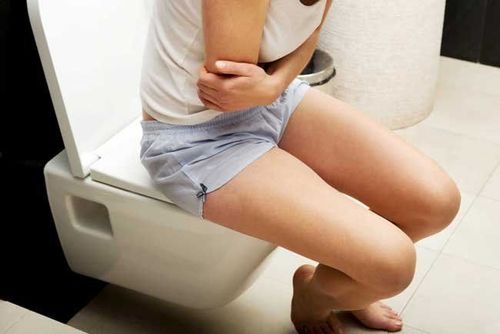This is an automatically translated article.
Posted by Master, Doctor Mai Vien Phuong - Department of Examination & Internal Medicine - Vinmec Central Park International General Hospital.Constipation is one of the most common digestive problems in the United States, affecting approximately 2.5 million people. It is defined as difficult, dry, or less than three bowel movements a week.
1. What causes constipation?
The main job of the large intestine is to absorb water from leftover food as it passes through your digestive system. It then produces feces (waste). The muscles of the colon eventually push the waste out through the rectum for elimination. If stool lingers for too long in the colon, stool can become hard and difficult to pass.
Poor diet frequently causes constipation. Adequate fiber and water intake are needed to help keep stools soft. High-fiber foods are often made from plants. Fiber comes in soluble and insoluble forms.
Soluble fiber can dissolve in water and create a soft, gel-like material as it passes through the digestive system.
Insoluble fiber retains most of its structure as it passes through the digestive system. Both forms of fiber join the stool, increasing its weight and size while softening the stool. This makes it easier to pass through the rectum.
Stress, change in habits, and conditions that slow the contractions of the colon muscles or delay your bowel movements can also lead to constipation.
Common causes of constipation include:
Low fiber diets, especially those high in meat, dairy or cheese Dehydration Lack of exercise Delaying the urge to have a bowel movement Travel or other changes changes in routine Certain medications, such as high calcium antacids and pain relievers Pregnancy Basic medical problems: Here are some underlying medical problems that can cause constipation:
Certain conditions such as: Stroke, Parkinson's disease, and diabetes Problems with the colon or rectum including bowel obstruction, irritable bowel syndrome (IBS) or diverticulosis disease Overuse of laxatives (medications that loosen stools) ) Hormonal problems including an underactive thyroid
2. What are the signs of constipation?
Everyone's definition of normal bowel movements can be different. Some individuals go three times a day, while others go three times a week.
However, you may be constipated if you experience the following symptoms:
Less than three bowel movements a week Hard, dry stools Straining or painful bowel movements Feeling full, even after a bowel movement Obstruction rectal obstruction
3. Who is at risk of constipation?
Eating an inadequate diet and not exercising are major risk factors for constipation. You may also be more at risk if:
Age 65 or older: Older adults tend to be less physically active, have underlying medical conditions, and eat worse. Confined to bed: People with certain medical conditions, such as a spinal cord injury, often find it difficult to have a bowel movement. A woman or child: Women are constipated more often than men, and children are affected more often than adults. Pregnancy: Hormonal changes and the pressure on your intestines from when your baby is growing can lead to constipation.
4. How is constipation diagnosed?

Many people affected by constipation choose to self-treat with dietary changes, increased exercise, or the use of over-the-counter laxatives.
However, laxatives should not be used for more than two weeks without consulting your doctor. Your body may become dependent on them for colon function.
You should talk to your doctor if:
You have been constipated for more than three weeks You have blood in your stools You have abdominal pain You are having pain with bowel movements You are losing weight You have sudden changes in your bowel movements Your doctor will ask you about your symptoms, medical history, and any medications or underlying conditions. A physical exam may include a rectal exam and blood tests to check your blood count, electrolytes, and thyroid function.
5. Constipation and Emergencies
Constipation is often a short-term problem that can be resolved with self-care. However, sometimes it needs urgent medical treatment. The following symptoms associated with constipation require urgent medical assistance:
Severe/or persistent abdominal pain Vomiting Bloating Blood in your stool
5.1. Constipation and severe chronic abdominal pain
If you are constipated, abdominal pain is common. Usually, it's just a result of the need to have a bowel movement or a build-up of gas. However, persistent, severe abdominal pain could be a sign of a more serious condition that requires immediate medical attention, including:
Perforated bowel or stomach Intestinal obstruction Appendicitis Pancreatitis Mesenteric ischemia (blockage of blood flow to the intestines)
5.2. Constipation and vomiting
If you're constipated and vomiting, it could be a sign of bowel movements. Stool rupture occurs when a large, hard mass of stool gets stuck in the colon and cannot be pushed out. This is an extremely dangerous situation and requires immediate medical attention.5.3. Constipation and bloating
Abdominal pain and bloating can be a sign of a serious bowel obstruction This condition requires urgent medical treatment. Stomach bloating can also be caused by:
IBS Stomach upset Small intestinal bacterial overgrowth (SIBO)
5.4. Constipation and blood in stools
If after going to the toilet you see a small amount of bright red blood on the toilet paper, it is likely due to a scratch in the area or the rectum hemorrhoids. In general, these are relatively easy conditions to treat and are not cause for concern.
However, if you notice bright red streaks on the toilet paper or stools, or you have black, tarry stools, call your doctor.
Among other conditions, blood in your stools can indicate:
Anal fissures Stomach ulcers Crohn's disease Cancers such as colon or anal cancer Constipation is a common condition that is usually not severe and also usually does not last for a long time. According to experts, only a small number of patients with constipation have a more serious underlying medical problem.
However, certain cases of constipation, marked by additional, pronounced symptoms, require urgent medical diagnosis and treatment. If your constipation is accompanied by the above symptoms, seek medical help right away.
Currently, Vinmec Times City International General Hospital is applying a method of treating cases of constipation due to a decrease or loss of defecation reflex by anal electrical stimulation combined with interference waves, biofeedback training. (Biofeedback). The above method has helped >80% of patients recover the defecation reflex, improve bowel motility and the process of excreting stools, helping to improve constipation.
Depending on the patient's constipation, the doctor will appoint necessary investigations such as: Colonoscopy with contrast, anorectal pressure measurement, assessment of bowel function and pathologies. related to the pelvic area,... To find out the cause, thereby giving the optimal treatment regimen. Hundreds of patients of different ages have achieved the desired treatment results. The most important criterion to evaluate the success of treatment is that the patient has a regular daily bowel movement, easier to pass.
Please dial HOTLINE for more information or register for an appointment HERE. Download MyVinmec app to make appointments faster and to manage your bookings easily.
References source: hopkinsmedicine.org, my.clevelandclinic.org, health.harvard.edu, mayoclinic.org














